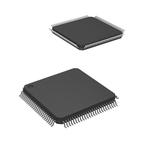● Low Supply Voltage Range: 3.6 V Down to 1.8 V
● Ultra-Low-Power Consumption
● Active Mode (AM): All System Clocks Active: 295 µA/MHz at 8 MHz, 3.0 V, Flash Program Execution (Typical)
● Standby Mode (LPM3): Watchdog With Crystal, and Supply Supervisor Operational, Full RAM Retention, Fast Wake-Up: 2.0 µA at 2.2 V, 2.2 µA at 3.0 V (Typical)
● Shutdown, RTC Mode (LPM3.5): Shutdown Mode, Active Real-Time Clock (RTC) With Crystal: 1.1 µA at 3.0 V (Typical)
● Shutdown Mode (LPM4.5): 0.45 µA at 3.0 V (Typical)
● Wake Up From Standby Mode in 3 µs (Typical)
● 16-Bit RISC Architecture, Extended Memory, up to 20-MHz System Clock
● Flexible Power Management System
● Fully Integrated LDO With Programmable Regulated Core Supply Voltage
● Supply Voltage Supervision, Monitoring, and Brownout
● Unified Clock System
● FLL Control Loop for Frequency Stabilization
● Low-Power Low-Frequency Internal Clock Source (VLO)
● Low-Frequency Trimmed Internal Reference Source (REFO)
● 32-kHz Crystals (XT1)
● High-Frequency Crystals Up to 32 MHz (XT2)
● Four 16-Bit Timer With 3, 5, or 7 Capture/Compare Registers
● Three Universal Serial Communication Interfaces (USCIs)
● USCI_A0, USCI_A1, and USCI_A2 Each Support:
● Enhanced UART Supports Auto-Baudrate Detection
● IrDA Encoder and Decoder
● Synchronous SPI
● USCI_B0, USCI_B1, and USCI_B2 Each Support:
● I2C
● Synchronous SPI
● Full-Speed Universal Serial Bus (USB)
● Integrated USB-PHY
● Integrated 3.3-V and 1.8-V USB Power System
● Integrated USB-PLL
● Eight Input and Eight Output Endpoints
● 12-Bit Analog-to-Digital Converter (ADC) With Internal Shared Reference, Sample-and-Hold, and Autoscan Feature
● Two 12-Bit Digital-to-Analog Converters (DACs) With Synchronization
● Voltage Comparator
● Integrated LCD Driver With Contrast Control for up to 160 Segments
● Hardware Multiplier Supports 32-Bit Operations
● Serial Onboard Programming, No External Programming Voltage Needed
● Six-Channel Internal DMA
● RTC Module With Supply Voltage Backup Switch


